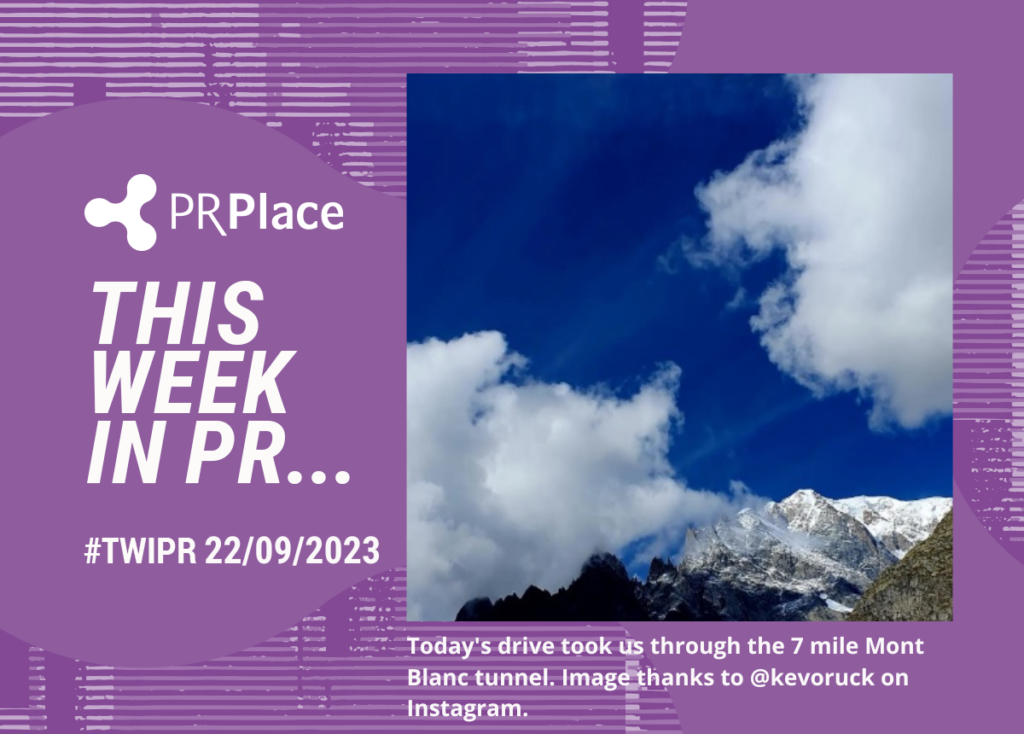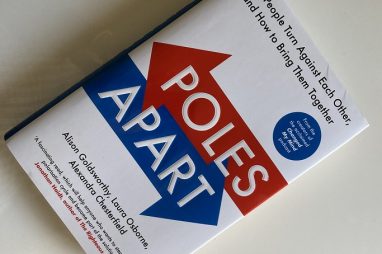This week in PR (22 September)

About the author
Richard Bailey Hon FCIPR is editor of PR Academy's PR Place Insights. He teaches and assesses undergraduate, postgraduate and professional students.

It happened this week
Profession and ethics
We are pleased to announce that @Advita_p will be the 2025 President of the CIPR.
She will become President-elect in 2024, having stood unopposed in the 2023 Election.
Find out more: https://t.co/9pLwzz2DKX pic.twitter.com/oj6IruaWIl
— Chartered Institute of Public Relations (@CIPR_Global) September 18, 2023
- Nitin Mantri: Ethics at the Heart of PR’s AI Adoption: A duty, not a choice (no date)
‘Gen AI does raise ethical concerns regarding content ownership, plagiarism, and the potential for spreading misinformation. These challenges present clear risks to a brand’s reputation and credibility.’
Purpose, climate and ESG
- Tom Haynes, Andrew Adie and others: A new approach to net zero – Pragmatic, proportionate and realistic plan or simply a government out of ideas? (21 September)
‘Net-zero by 2050 is a statutory obligation for the UK and having a regulatory framework that gets us there and provides a level playing field for business and guidance for consumers is critical. What we got yesterday was the net zero can being kicked down the road without a clear plan for how we deliver the infrastructure and change in consumer and corporate behaviour needed to get us to the revised deadlines.’ - Talia Shehadeh: The pressure is on: looking ahead to COP28 (20 September)
‘30th of November 2023 will mark the start of the 28th United Nations Climate Change conference in Dubai, United Arab Emirates. The UN Conference of the Parties (COP), as it has done since the first COP in Bonn in 1995, brings together world leaders, policymakers, scientists, and activists to discuss and implement emissions reductions and mitigation and adaptation strategies.’
Consulting, skills and careers
- Lucy Scaramanga: Career change: How to stay in PR but switch industries (21 September)
‘If you’re hoping to move into a specialist PR industry such as financial, digital or sustainability communications, consider where your knowledge lies and crucially where it’s lacking. Is there a course that can help you gain a deeper understanding of the prospective industry and provide you with a solid and up-to-date foundation to grow from?’ - Anthony Hughes: Why communications is even more critical for early-stage companies (21 September)
‘Unless you are backed by a celebrity, or a well-known entrepreneur with a killer track record and buckets of cash, one of the challenges typically faced by start-ups is a lack of positive profile and reputation.’
- Benjamin Hart: Theory vs Practice: Did my PR degree help me prepare for a career in PR? (no date)
‘There is an underlying narrative that implies one needs a PR degree to venture into a career in PR, but this could not be further from the truth. When starting at Spreckley, I felt like a PR novice, but with a great support network and inclusive training, I’ve learnt skills that I did not possess upon graduating from university.’ - Ben Smith: Andy Peake, London CEO of VCCP on the PRmoment Podcast (20 September)
‘We wouldn’t describe ourselves as an advertising agency: we call ourselves an integrated creative agency. We see our role as building brands that are distinctive over the longer term.’
- Rachel Emmett: An ex-BBC journalist describes why she has settled in PR (1`9 September)
‘In my journalistic days, I might have dismissed PR as mere fluff – a realm of spin, cover up and manipulation or perhaps cats, kittens and glamorous awards ceremonies. My perspective changed drastically thanks in part to two fantastic communication professionals I worked with regularly as a journalist – one a hospital comms manager, and the other the head of communications for a children’s charity.‘
- Brendon Craigie: Why efficiency shouldn’t be a dirty word for PR and comms agencies (19 September)
‘For many agencies the binary way to respond to a drop in revenues is to cut costs, and in a people-focused PR and communications business where staff costs will make up anywhere between 50-65% of your overhead, the obvious way to do this is to reduce headcount and extract more work from the headcount that you retain.’ - Maja Pawinska Sims: Headliners: Marshall Manson (15 September)\
‘It’s another period of heightened uncertainty in a landscape that seems forever uncertain. But that’s when PR really thrives. We roll with the agenda, tracking the pulse of the conversation. So the biggest opportunity is helping our organisations and clients navigate that uncertainty.’
- Sarah Waddington: Book review: ‘How To Sell Value – Demystified’ by Crispin Manners (15 September)
‘According to research by the PRCA, 83% of agencies don’t sell by value. Manners comments that the book is “designed to help people chart a way out of this painful cycle by adopting a behaviour change that makes the work they do more intellectually, emotionally and financially rewarding.”
Gender, diversity, health and wellbeing
Public and third sectors
- Matt Nicholls: New local government comms leaders network launched – be at the first event (17 September)
‘The LGA is setting up a new Local Government Communications Leaders’ Network. With the support of some of our fantastic and hugely experienced associates – Darren Caveney (also of this parish), Fran Collingham, Paul Masterman and Dawn Reeves – we will be holding the first meeting of the network on Wednesday 11 October in Birmingham, hosted by our friends at the city council.’
Politics, public affairs and public sphere
- Alex Otway: What does the local government funding crisis mean for devolution? (19 September)
‘The public realm is quite literally collapsing. Schools crumbling. Prisoners escaping. Sewage everywhere.And now, the biggest local authority in Western Europe going bankrupt. But Birmingham isn’t the first, and won’t be the last.’ - Stuart Thomson: The Never-Ending Story: Is HS2 Coming To The End Of The Line? (18 September)
‘HS2 is no longer a transport project, it has become a symbol for failed long-term policy-making.’
- MHP Group: The rise of the ‘Super Distruster’ is a major challenge for communicators (18 September)
‘While Super Distrusters’ specific concerns and targets vary, their analysis leads them to the same place, distrustful of traditional authority, expertise and increasingly hostile to innovation and technology, which they see as having the potential to give more power to authoritarian elites. Protests against ULEZ cameras, 15 Minute Cities and digital cash are all manifestations of these fears.’
- Rihanna Riley: What does Angela Rayner’s new role mean for devolution? (15 September)
‘There’s no doubt that her life experience will fuel her fire to “get things done” when it comes to the DLUHC brief. An outspoken advocate for regional rebalancing and a staunch critic of the Tories’ approach to ‘Levelling Up’ (or “levelling down”, in her own words), Rayner has promised, “We’ll bring good jobs back to places that have lost them, and get money back in people’s pockets – Labour will give our young people a fair start in life, by making sure every young person has access to education, training, or work.” ‘
Crisis, risk and reputation
- Amanda Coleman: Recognise the seriousness of the situation (16 September)
‘There are serious allegations that have been made about the comedian Russell
Brand that have been detailed in the Channel 4 Dispatches programme tonight and
in The Times newspaper.’
Internal communication
Internal Communication Diploma
- Aniisu K Verghese: 6 Approaches to Tap Generative AI for Internal Communications (21 September)
‘In this article, I explore the impact of Generative AI on internal communications and delve into strategies for its successful integration.’ - Dan Holden: A candid conversation with Sophia Walker (20 September)
‘Over my career so far, I’ve watched internal communications become a trusted and valued profession. The first two companies I worked at didn’t have internal comms departments, and now there are a plethora of roles available in IC.’
- Janet Hitchen: Internal Comms is a Business Driver. (19 September)
‘Internal communication done well makes a real difference and delivers for the business. It shifted how we were seen as a team. The commercial team saw how we could drive business outcomes when no-one else could. The Marketing team considered our ability to influence and encourage internally and how they could leverage that going forward.’
Media, digital and technology
- Robin Tozer: Burn Hollywood burn (21 September)
‘All is not well in Hollywood. A strike by actors and writers over fears of how studios might use AI, and the falling value of residuals (money received by performers for repeat showings of their work), has shut down Tinseltown.’
- Jen Kelham: Three key takeaways from Babel’s latest AR whitepaper (20 September)
‘According to Babel’s latest B2B Tech Comms Barometer, the single most influential channel for B2B tech buyers is analyst industry reports, with 58 per cent of IT decision-makers relying on them for influencing and making purchasing decisions.’
- Stuart Bruce: Humans Needed More Than Ever – new AI in PR report from CIPR (19 September)
‘It reports most public relations tasks are being infused with AI. The report concludes that as adoption accelerates, low-level and entry-level tasks are being displaced, creating an opportunity for a profession-wide strategic shift in focus.’
- Duncan Chapple: Undertstanding the significant role of industry analysts in the cybersecurity buying process (no date)
‘Industry analyst reports are the only information source used by most B2B buyers when selecting a security solution provider.’ - Stephen Waddington: Humans still needed in AI-assisted public relations (19 September)
‘The [CIPR] study found that up to 40% of public relations tasks now utilise AI assistance to some degree. The analysis is consistent with a CIPR report published in 2018 called Humans Still Needed.’ - Thomas Stoeckle, Sam Knowles and Neville Hobson: Mirror, mirror, on the wall, who will be the sexiest chatbot of them all? [podcast] (18 September)
‘I don’t recognise much intellectual heft in the [anglophone] PR industry. I still think there’s little understanding of the connection between psychology and behaviour change. The PR industry missed the boat on social media and the same is happening with AI.’ - Dan Slee: IT’S HERE: What you need to know about WhatsApp Channels (16 September)
‘What’s WhatsApp Channels? Basically, it will allow organisations to be able to use WhatsApp itself as a way to reach people on the platform. This is huge, huge news given that around 80 per cent of 18 to 64-year-olds use the platform (source: Ofcom).’


